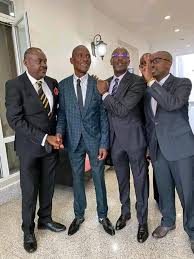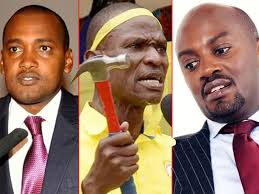By CHANGE OF GUARDS
Last week, the focus of almost the entire country was on the small village of Matale in Kyotera District, where the remains of Joseph Tamale Mirundi were laid to rest. He was a veteran journalist who built his career from scratch, rising to formidable fame. His natural skills in comical, satirical, and aggressive presentation of social, political, and economic events earned him admiration from a wide audience. Equally, his uniquely accurate analysis of such issues was unmatched and often a source of envy for some. His pride and self-praise for being fearless, supernaturally intelligent, and materially wealthy had become his brand.
Starting as a mere newspaper vendor in the late 1970s and early 1980s, he eventually built a successful career in the media industry. As a Muganda and a devout Catholic, he subscribed to the Democratic Party (D.P). Interestingly, he survived the wrath of the UPC regime against the D.P in the Buganda region, allegedly due to opportunistically carrying out propaganda assignments for UPC strongmen Paulo Muwanga and Sam Mugwisa. When the UPC government was overthrown by the DP, using Acholi soldiers in July 1985, Tamale Mirundi reached out to Museveni’s NRA. In August 1985, he visited the then-Liberated Zone, where he met Gen. Saleh. Back in Kampala, he wrote an article attempting to disprove, among other things, the narrative that the NRA had a communist agenda on land matters. During the early days of Museveni’s presidency, Tamale Mirundi excelled in asking stingingly tough questions during the former’s press conferences.
During the 1996 presidential polls, he actively supported D.P.’s Paul Ssemogerere against Museveni. In 2001, he contested for the parliamentary seat for Kyotera District but lost to Museveni’s candidate, Pius Mujuzi. He founded the short-lived Lipoota and The Voice newspapers, allegedly with funding from Museveni, coordinated by ESO’s Maj. Kamya Ssebyatika and Capt. Mulindwa Birimumaso. He excelled in TV and radio talk shows, popularly known as Ebimeeza. Dominated by criticism of the Museveni regime, the Ebimeeza afforded Mirundi a very large following, especially at a time when cracks in the relationship between Buganda and the Museveni regime were becoming more visible.
Fearing that Mirundi was harboring presidential ambitions, Museveni moved quickly to nip them in the bud. He sent his then-PPS, Amelia Kyambadde, to recruit Mirundi before appointing him as Presidential Spokesman. Indeed, Mirundi, who harbored presidential ambitions, had intended to use the new position to build his political profile while gaining first-hand experience in statecraft. However, he didn’t realize that his appointment was actually meant to destroy his political prospects. In the same regard, the Pope had blessed him by placing his hand on his head in 2009. Regrettably, in order to appease Museveni, he made it a routine to demonize the leadership of the Buganda Kingdom, the Church, and the political opposition fraternity. He turned the respective leaders of these institutions into his punching bag. Branding himself as Museveni’s “Barking Dog,” he not only aggressively defended Museveni but also mercilessly went after anyone holding views different from those of Museveni. Museveni would simply ignore protests from those aggrieved by Mirundi’s attacks.
Satisfied that Mirundi’s political prospects had been neutralized, Museveni sacked him in July 2015. He was accused of campaigning for Museveni’s then-political rival, Amama Mbabazi, who had been dismissed as Prime Minister and regime party Secretary General around late 2014. Mirundi was instead offered the cosmetic reassignment of Senior Presidential Advisor on Media. This development drove Mirundi to claim that he had been a victim of intrigue, nepotism, and sectarianism. Describing Museveni’s handlers as “Mafias,” he accused several individuals of being behind his downfall. He went on a rampage, attacking everyone around Museveni. However, typical of hypocrites and opportunists, he refrained from directly attacking Museveni. His 2019 book titled The Politics of Banyampi was, however, a crystal-clear, stinging critique of Museveni. The title derived from the practice by African chiefs and kings of positioning specific subjects around them to take the blame whenever the principal passed bad air. He masked his rage in public expressions of love and support for Museveni’s son, Gen. Muhoozi, brother, Gen. Saleh, and the then-police chief, Gen. Kale Kayihura.

Mirundi defiantly refused to take up his new assignment but continued to enjoy the salary, official car, and security detail. He consistently boasted that he would never kneel before his tormentors until he went to the grave. Indeed, his persistent stinging attacks on the so-called Mafias in the Museveni government earned him public admiration. He received a lot of moral and financial support from his followers and also made good money from his satirical short book publications. However, the regime refused to pay him nearly a billion shillings for the propaganda publications he had supplied during election campaigns. As his rage intensified, in 2019, he claimed that he had been poisoned by the so-called Mafias within the regime. It was reported that at some stage, Museveni branded him a madman. As his health deteriorated, he sought refuge in Gen. Muhoozi’s PLU, reconciled with some of his so-called tormentors, and accepted government sponsorship for treatment abroad in 2023.
During his final days, as his health deteriorated and ran out of cash, he reluctantly accepted financial help from his former tormentors. As his condition worsened, he asked his brother to seek Museveni’s assistance for treatment abroad. He spoke to Museveni on the phone, apologized for any wrongs he had committed against him, and pledged to work for him once he recovered. Museveni offered to send his personal physician to assess whether treatment abroad was necessary. Unfortunately, that very day, his health deteriorated further, and he passed away. The government covered all his medical bills, amounting to 43 million shillings, and provided 30 million shillings to each of his homes for funeral arrangements. The government also took on the burial expenditures. One of his alleged top tormentors, Gen. Nalweyiso, was present to coordinate all the financing from the government.
In their eulogies, his children and widow went on a begging spree, appealing to Museveni and his associates. They praised their father’s alleged tormentors for their supposed love for him.
“The President loved Mzee Tamale so much. If he didn’t, he would have imprisoned him for some of the mistakes he made. You are all aware that Mzee had his differences with Gen. Nalweyiso, even insulting her at times. However, when it was reported that Mzee was ill, I received a call informing me that the General had ordered that, despite everything, he should be well taken care of. She cared for him deeply. Gen. Nalweyiso could get mad at Mzee, but she never held a grudge. We thank you so much.”
They also pleaded for scholarships, funding for income-generating projects, and the construction of a monument in memory of their father. It became evident that the children were set to continue from where their father had left off, after he accepted responsibility for the mistakes he had made.
NFORMATION IS POWER AND THE PROBLEM OF UGANDA IS MUSEVENISM







Discussion about this post